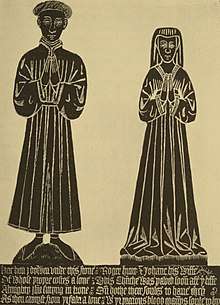Roger Hunt (speaker)
Roger Hunt (died c. 1455) was an English MP and Speaker of the House of Commons.

Life
He was of obscure origins, but acquired the manor of Molesworth in Huntingdonshire and acquired a circle of influential friends such as Sir John Tiptoft and John Mowbray, the future Duke of Norfolk. About 1402, he leased a London house, perhaps while training as a lawyer at Lincoln's Inn, and became royal attorney for the common pleas, under Tiptoft's patronage, from 1408 to 1410.[1]
In 1407, he was returned as knight of the shire for Huntingdonshire, the first of eighteen times he was elected to parliament, being returned on every occasion except one (December 1421) between then and 1433. On three occasions (1414, 1416, and 1420) he chose to represent Bedfordshire, where he had interests at Chawston, instead of Huntingdonshire. He was elected Speaker of the House in 1420 and again in 1433.[2]
Following his parliamentary career he was appointed High Sheriff of Cambridgeshire and Huntingdonshire for 1433 and 1434. He was appointed second baron of the exchequer in 1439 until 1447.[3][1]
He died about 1455. He had married Margery, whose surname was probably Bullock; they had a son, Roger, who succeeded to his father's estates in July 1456.[1]
References
- Roskell 1993.
- Archbold 1891.
- Sir John Sainty (comp.) The Judges of England, 1272-1990: a list of the judges of the Superior courts (Selden Society: Supplementary Series 1993, 10), 117.
- Attribution

- J.S. Roskell; L. Clark; C. Rawcliffe., eds. (1993). "Hunt, Roger of Chawston, Beds and Molesworth, Hunts". The History of Parliament: the House of Commons 1386-1421.
| Political offices | ||
|---|---|---|
| Preceded by Roger Flower |
Speaker of the House of Commons 1420–1421 |
Succeeded by Thomas Chaucer |
| Preceded by Sir John Russell |
Speaker of the House of Commons 1433 |
Succeeded by John Bowes |
.svg.png)